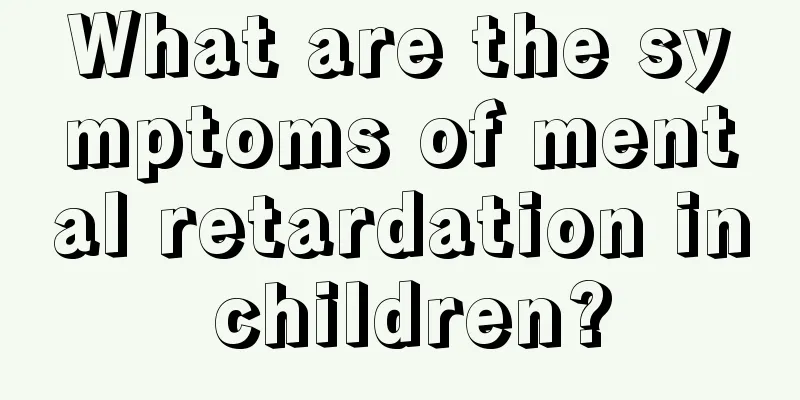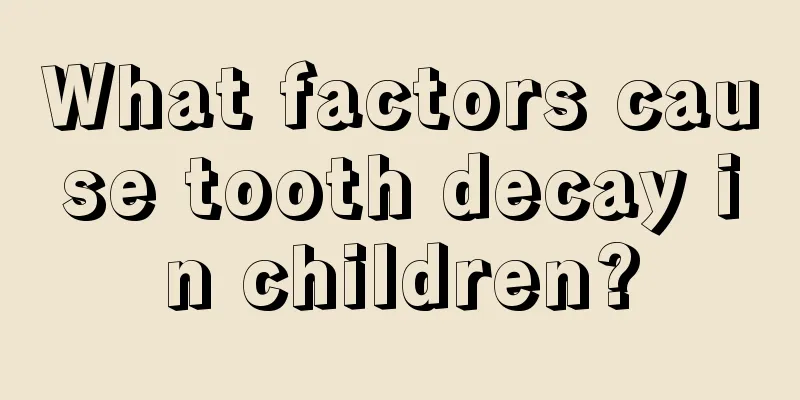What are the symptoms of mental retardation in children?

|
Many mothers nowadays are relatively young, and they tend to get nervous or even panic when encountering things related to their children. Especially when encountering some abnormal behaviors of children, you will become overly nervous. You should learn more about children in your daily life. Now I will tell young mothers about some manifestations of different degrees of intellectual retardation in children for your reference. 1. Mild mental retardation: accounts for 75%-80% of mental retardation, IQ50~70, and adaptive behavior is mildly defective. Clinical manifestations: slightly delayed development, late language development, no major difficulty in daily language, slow reaction, lack of independent thinking, inability to cope with changes in the outside world, easily influenced by others, lack of logical connection in understanding comprehensive analysis, difficulty in grasping abstract things, poor academic performance, able to perform simple calculations but difficult to understand applied problems, able to memorize but unable to apply correctly. 2. Moderate mental retardation: accounting for about 12% of mental retardation, IQ35~49, and moderate defects in adaptive behavior. Clinical manifestations: Development is slower than normal children. Early development such as walking, speaking, and control of defecation and urination are delayed. Language ability is poor, vocabulary is limited, and expression ability is also poor. They have simple thinking but cannot understand abstract concepts. Their recognition ability, reading and calculation ability are poor. They can only add and subtract within 10 or imitate writing but cannot understand the meaning. 3. Severe mental retardation: accounting for 7%~8% of mental retardation, IQ20~34, severe defects in adaptive behavior: Clinical manifestations: delayed development in early years, slow response to surrounding things, slurred pronunciation, extremely poor expression ability, lack of abstract and comprehension ability, childish emotions, clumsy movements, often repeating purposeless movements, often accompanied by severe sensory and motor disorders, unable to calculate at all, can recognize relatives but cannot form a deep impression, cannot take care of themselves but can avoid obvious dangers. 4. Extreme mental retardation: accounts for 1%~2% of mental retardation, IQ20c gh, extremely defective adaptive behavior, clinical manifestations: poor development, no language ability, inability to recognize relatives and environment, loss of direction, very poor perception, obvious movement disorders, inflexible hands and feet, stiff joints, unable to walk, can only cry or scream to ask for food or express discomfort, accompanied by multiple diseases, poor resistance, unable to avoid danger, unable to take care of themselves, and completely dependent on others for care. Normally, many mothers will read a lot of books about children's growth when they are pregnant. This is also a manifestation of great wisdom. It is always good to be prepared so that you will not be in a panic when encountering problems. It is a good choice to read the above articles carefully and summarize them. |
<<: What are the symptoms of intellectual disability in newborns?
>>: Causes of delayed language development in children
Recommend
What is the cause of the sunken fontanelle in babies?
Some babies have a sunken fontanelle, but parents...
What happens when children talk in their sleep?
In life, we often hear people around us talking i...
How to deal with ulcers at the corners of children's mouth
Ulcers at the corners of children's mouth are...
Tips for growing baby eyelashes
How to make your baby's eyelashes grow longer...
Methods for collecting blood from the soles of newborn babies
Heel blood sampling should be done within 3 to 7 ...
Complete knowledge of baby's hearing
Nowadays, every child is the treasure of the fami...
Baby always puts his hands in his mouth
Parenting experts told us that if a baby always p...
What are the symptoms of developmental delay in girls?
Many parents will find that when children reach a...
What is the reason for the blood streaks in the stool of a two-month-old baby?
What should we do if there is blood in the stool?...
Early symptoms of childhood lymphoma
Lymphocytes are cells that everyone has. Because ...
What is the massage technique for children's cough
Every family hopes to have a healthy baby, so the...
What are the manifestations of precocious puberty in boys?
I believe everyone knows what precocious puberty ...
Is high crp in newborns serious?
Generally speaking, if the crp of a newborn is re...
Why are children's feet itchy?
Itchy soles of children's feet are usually ca...
Causes and treatments of yellow urine in two-month-old babies
Babies of one or two months old need to drink bre...









